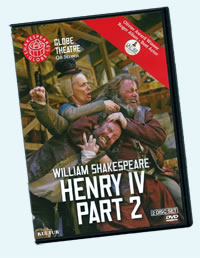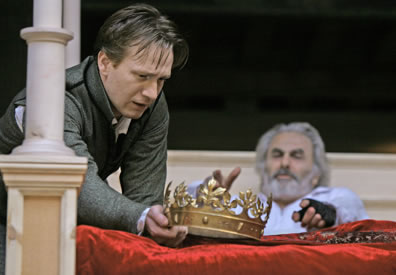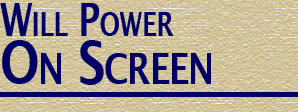Henry IV, Part Two
Fumbling into Royalty
Kultur/Shakespeare's Globe (2012)
Directed by Dominic Dromgoole, with Roger Allam, Jamie Parker, Oliver Cotton, Barbara Marten, William Gaunt, Patrick Brennan, Christopher Godwin.
 The compositional history of Shakespeare's second Henriad is uncertain. We know that Henry IV, Part One, and Part Two and Henry V were written in that order, but we can't be sure of the moment that Shakespeare decided to split Henry IV into two parts and when he decided to continue Hal's story with Henry V. The Merry Wives of Windsor's uncertain place in the sequence adds a further dynamic to the mystery, especially given the fact that he wrote that play around Falstaff but killed off Falstaff before he could appear in Henry V, despite telling audiences in the epilogue to Henry IV, Part Two, that Falstaff would return for the third installment.
The compositional history of Shakespeare's second Henriad is uncertain. We know that Henry IV, Part One, and Part Two and Henry V were written in that order, but we can't be sure of the moment that Shakespeare decided to split Henry IV into two parts and when he decided to continue Hal's story with Henry V. The Merry Wives of Windsor's uncertain place in the sequence adds a further dynamic to the mystery, especially given the fact that he wrote that play around Falstaff but killed off Falstaff before he could appear in Henry V, despite telling audiences in the epilogue to Henry IV, Part Two, that Falstaff would return for the third installment.
I believe that Shakespeare viewed Henry IV, Part One—at least his final draft—as a stand-alone play, with its fully realized thematic, character, and imagery arcs. However, the final scene clearly points to a sequel (like Darth Vader spinning out into space at the end of the original Star Wars). Something seems to have happened between the writing of the two parts, for while the end of Part One points to the continuing story of Hal and his father, Henry IV, the titular character has only two scenes in Part Two, and Hal doesn't show up until the play's fifth scene.
What happened, it seems, is Falstaff intervened. We have plentiful evidence of the character's popularity in Shakespeare's time, and it's probable that his fame blew up during Part One's opening run. Shakespeare, being the commercial artist he was, made sure the sequel to his Henry IV play featured more Falstaff; much more Falstaff. Thus we find Falstaff in various scrapes and encounters and subplots that have little if anything to do with the story of Hal. We hear him soliloquize on topics that have little if anything to do with the play's themes.
All of which is fun stuff when you have a skillfully played Falstaff, and they come no more skillful than Roger Allam in the Shakespeare's Globe production of Henry IV, Part Two, staged at the theater in 2010 and, filmed before a live audience, just released on DVD. Allam won the 2011 Olivier Award for Best Actor for his performance as Falstaff in both this play and Part One.
Despite featuring Allam's masterful Falstaff, this production merits most in its development of Prince Hal. Director Dominic Dromgoole obviously took a two-play approach to the story of Hal, acted with many dimensions and much depth by Jamie Parker. Shakespeare seems to restart Hal's story in Part Two; the original and the sequel give the prince parallel paths, beginning with the Eastcheap pranks, running through emotional confrontations with his father, and ending with his establishing himself as right royal. Dromgoole, though, sees Part Two's Hal as a further evolution of the prince who begins Part One as a madcap ruffian, who would rather play than be king but takes hold of his fateful place—albeit with much trepidation—and ends up defeating his rebel rival at Shrewsbury.
When in Part Two he first appears just returned to London from the wars, Parker's Hal has certainly matured and embraced his place in court, but he still yearns for his hell-raising days and the uncomplicated pleasures he knew then. Old friend Poins (Danny Lee Wynter) is proving a shallower companion than he seemed to be before, but Hal jumps at the chance to punk Falstaff again (unfortunately, Dromgoole cuts out Hal's reading Falstaff's letter, and with it the suggestion that Poins is playing Hal—I would have liked to have seen Parker's Hal address Poins on this point). In the tavern, though treated as a returning hero, Parker's Hal is no longer emotionally integrated with the others, his manners clearly setting him apart—and above—the rest. His self-chastisement upon the news arriving from the court, in contrast to the parallel moment in Part One, reveals Hal's true state of mind at this point, and he rushes out of the tavern giving Falstaff a curt "good night."
Hal's subsequent interactions with his father (Oliver Cotton) are tricky. Prince and king have never been on close terms, so Parker's Hal is uncertain of not only royal protocol but suitability of emotions and behavior regarding his dying dad. It's a father and son straining for closure, and neither is fully accommodated, one as he passes on to the afterlife, the other as a new life passes to him. Hal's first steps as king are literally halting in the way Parker plays this scene, still finding his way to royalty. Recalling the way Parker delivered his "I know you all" speech in Part One, this Hal is not a schemer (remember that Poins is the mastermind of both pranks on Falstaff), so when as king he first encounters the Lord Chief Justice (Patrick Brennan), Hal clearly intends to dispossess him of his authority. But the Lord Chief Justice's defense of his previous actions toward the wayward prince notably influences this Hal's thinking, and he realizes he not only must keep his former nemesis as his Lord Chief Justice, he would like him to become his chief counselor. Parker's Prince Hal at this moment becomes the King Henry V of the next play. Never mind his promise back in Part One to some day banish Falstaff; the fat knight's fate is not fully sealed until now, and Parker's Hal has no hint of affection or even fond recollection as he dresses down Falstaff in the final scene.
Allam's Falstaff, of course, is oblivious to what's coming. He doesn't note Hal's altered behavior in the tavern, and he so focuses on his scamming of Shallow that he loses track of the prince's movements. I wrote in my review of the Part One production that disingenuousness is this Falstaff's true genius, and Allam keeps that charming quality going well into Part Two. But increasingly, his lies don't seem to be working; in fact, he's out-equivocated at times. In his scene with Doll Tearsheet (Jade Williams), when she replies to his "I am old, I am old" with "I love thee better than I love e'er a scurvy young boy of them all," Allam's Falstaff looks at her with genuine appreciation; but you can't help thinking she's stringing him along. At Gaultree, Falstaff's mountain of lies has created an accepted truth about his valor that inspires Sir John Coleville (Kevork Malikyan) to yield to him; but as Falstaff boasts of his prisoner, John of Lancaster orders Coleville's execution and Falstaff loses out on the ransom. In fact, Falstaff's lies seem petty compared to the grand equivocation that Lancaster and Westmoreland pull off in tricking the rebel leaders to dismiss their army only to arrest and execute its members (a treachery John couches in Christian doctrine). In Gloucestershire, when Shallow recalls his and Falstaff's youthful days at the Inns of Court, Falstaff bemoans to the audience how old men will lie; but the memories touch Falstaff enough that Allam feelingly speaks the line, "We have heard the chimes at midnight, Master Shallow." At play's end, after Henry V's pronouncement of banishment, Allam's Falstaff has lost the ability (and maybe the will) to lie, even as he tries to convince Shallow that the king was only pretending for public face. Falstaff is either shocked or brokenhearted, maybe both. He's definitely defeated, his power over others depleted.

Jamie Parker (Hal) and Oliver Cotton (King Henry IV) in the Shakespeare's Globe production of Henry IV, Part Two at the re-created Shakespeare theater in London. Photo by John Haynes, Shakespeare's Globe.
Using the same actors as in Part One, Part Two displays a mostly strong lineup of talent. William Gaunt, who played a memorable Worcester in Part One, comes back as a daffy Shallow in Part Two, slightly tipsy and something of an old hippy with a bit of hallucinogen still in his system. This works until Dromgoole establishes a running joke by giving a sexual tinge to Shallow's frequent references to Falstaff's page (Oliver Coopersmith). Though the audience laughs, pedophiles are not funny, and this becomes a big distraction from this otherwise comical and emotionally pivotal scene (where Falstaff learns of Hal's ascension to the throne). Christopher Godwin moves from Northumberland to the role of Silence, and his is a preciously silly Silence indeed.
A revelatory performance is Joseph Timms as John of Lancaster, Hal's younger brother. Joyless, thankless, remorseless, he is certainly his father's son, and Timms uses the role's spartan verse to create a personality that's almost repulsive in its sterility. Unlike Part One with its lively, action-packed dialogues, Part Two is a wordy play full of long, mind-dulling speeches (even by Falstaff). The rebellion scenes are the worst, and even the best of actors can become drones in these moments, so it's a credit to Timms that he uses that quality of the verse to his character's advantage.
While Henry IV, Part One, stands alone as a great play, Henry IV, Part Two, needs its antecedent to merit watching. It has its rewards in Henry IV's great speech that "uneasy lies the head that wears the crown," in the introduction of Pistol (played here by Sam Crane), in the Gloucestershire scenes, and, of course, in Falstaff. Shakespeare's Globe's production has further worth in showing us how Hal becomes Henry V. As Dromgoole shapes it and Parker plays it, that's a story worth continuing, even without Falstaff.
Eric Minton
August 9, 2012
Comment: e-mail [email protected]
Start a discussion in the Bardroom



 Find additional Shakespeareances
Find additional Shakespeareances